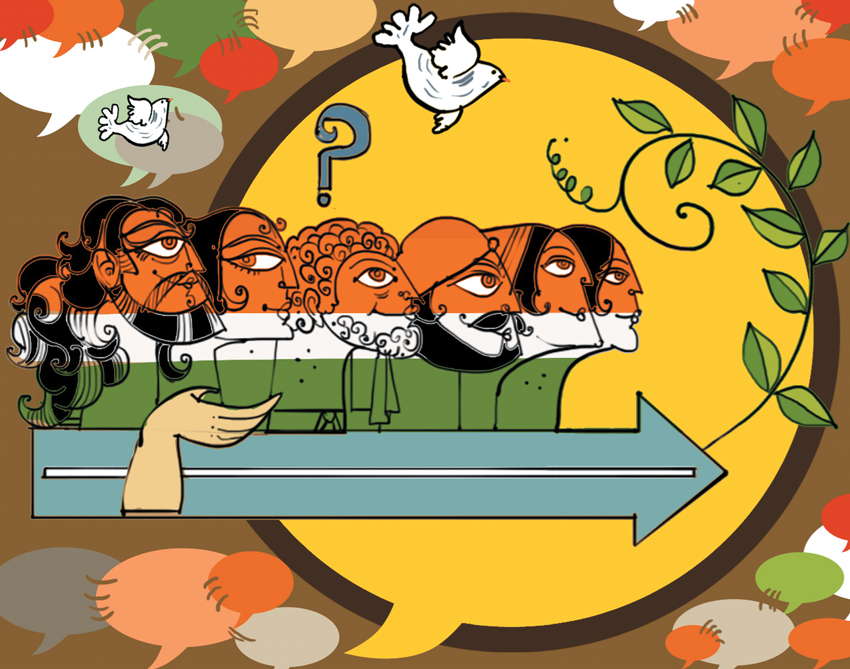
The recent change in the political status of Kashmir has deeply wounded the Kashmiris. There is anger, fear, alienation and loss of self-respect. Many have addressed the hurt to Kashmiriyat from a legal or historical perspective. But what is needed is a deeper appreciation of the fact that national and regional identities are imagined creations. Both Hindutva and Kashmiriyat are invented. The only real 'consent of the people' is the desire of a person to live in a country. This means that India must become a desirable place to live, not only for Kashmiris, but for all Indians.
India is a union of many identities and some have asked if the injury to Kashmiri identity is different from the pain, say, of the proud people of Andhra who lost half their state a few years ago? Others have argued that Kashmir is a border state with a history that makes it unique. But there are other border provinces, such as Punjab, where people lost their homes and lives during Partition. Their pain was even more poignant and heart-breaking. Later, Punjab was further divided into Haryana and Himachal. Were the people of Punjab or Andhra asked about these changes?
Some liberals believe that a plebiscite is the only real form of consent and Kashmiris should be given a choice to secede on the principle of self-determination. If this is true, are we not morally bound to have a referendum in Andhra Pradesh? Thinking back to 1947, should we not have applied this principle to the citizens of 565 princely states who occupied 40% of India's territory when the British left? Kashmir was only one of these. BR Ambedkar felt that India was a nation of 3,000 jatis. Should there have been 3,000 referendums? Moreover, shouldn't Indians under the Raj have also been given a choice – to be ruled by the British or by Indians? If enough Indians had wanted the British to stay on, there might never have been a free India. A referendum can become a path to befuddlement as Britain has discovered after Brexit.
The idea of a nation-state based on common descent, language, and shared culture is a recent invention. Although born in the Treaty of Westphalia (1648), the idea did not spread until the 19th century. At the fall of Napoleon in 1815, Europe still consisted mostly of empires and kingdoms. After that, Europeans deliberately went about crafting nation-states. Since natural unity was usually absent, their leaders 'manufactured' it and sold it to the people through mythologised versions of history in school textbooks. Hindu nationalists are trying to do the same today.
Repelled by the horror of World War I caused by ugly nationalisms, the world was drawn in the 1920s to the moral idea of national self-determination. Leaders of the freedom movement in India also realised that their claim to self-rule would depend on proving that their country was a nation. It was important because many colonial rulers of the British Raj believed that India was merely a 'geographic expression' (in the words of Winston Churchill). Mahatma Gandhi, thus, became our chief mythmaker.
Today, Kashmir's integration into India invites the same question: What is a nation-state? Inventors of the idea would say, it is a sentiment, a fellow feeling that unites Indians, giving a sense of oneness. The problem is that this positive feeling often turns negative – an antipathy towards those who are different. Kashmiri Muslims might protest they don't have a fellow feeling for Hindus, and this was the argument for creating Pakistan. The answer is that most nations contain many religions; even Muslims live as a minority in many countries. Religion is thus not a sound basis for nationhood. This logic can also be extended to race and language in a multicultural world.
Another source of fellow feeling might be the possession of common memories of celebrations and sufferings. The problem with historic memories is that they can also divide. Memories of invasions, of temples destroyed are a source of anguish for one person and heroism for another. Mahmud of Ghazni, who sacked Somnath, is a villain in Hindu eyes and hero among Muslims. So, this criterion also fails and forgetting history is often better for nation building.
Since all criteria of identity fail for a nation-state, we must face the inconvenient truth that a nation is an 'imagined community' as Benedict Anderson has taught us. Identity has nothing to do with it. All modern states and regional identities are artificial constructs where most citizens are strangers who will never meet. There is no natural glue that unites the people of India or of any nation, or of Kashmir, Bengal or Andhra. Hindu nationalists and Kashmiri separatists need to understand this. Both Hindutva and Kashmiriyat are fictions. India was invented on January 26, 1950, on the premise that everyone who resides in its territory will have maximum equal freedom and there will be no second class citizens.
After the dust settles, the unhappy manner of integrating Kashmir into the Indian Union will matter less. A successful, non-resentful assimilation of Kashmiris will eventually depend on how desirable India is in the eyes of the ordinary Kashmiri. The job of the Indian state is crucial to this end: to create predictability through good governance, ensure everyone is equal before the law, give people choice to change their rulers, provide opportunity for education and health, and craft conditions for prosperity. This is the main reason why anyone will choose to live in India. It is the only real 'consent' in a world where nations are invented and nationalism is fictional.